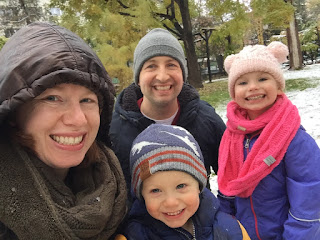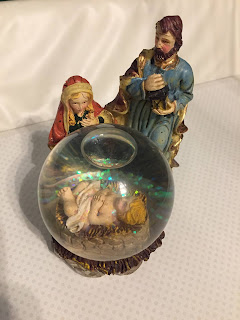I don't think it's ever happened before. At least not to me. Could my mother's voice really make me that emotional?
We were blessed this year, blessed beyond measure, to spend the month of December with family in the United States. We did A LOT of driving - over 50 hours - and visited a lot of family and friends and churches. Jessica and I even took our first overnight trip ever without kids. Christmas Day found us in the loving home of Jessica's parents in Charleston, West Virginia. The next morning we drove six hours south to my parents in Maryville, Tennessee.
I am the oldest of three siblings. It is an interesting dynamic to see my brother, sister, and I with our spouses, nine little kids, and my brother's little dog, Nacho, all piled together in my parents' home. So much laughter. So many toys.
Until this year, our kids (ages three and one) had never spent Christmas in the US. It was so thrilling seeing our daughter, Sara, "help" each person unwrap their gifts. Then she'd jump for joy out of excitement. Yet one gift stands out.
I guess I must have missed Sara opening it. Actually, I
heard the gift before I saw it. "I know it is hard when we are apart..." The recording was muffled somewhat, yet clearly it was my mom's voice. The book, titled
When..., is a record-a-story. Grandparents (or whoever) can pre-record themselves reading so that, at any time, kids can press a button and hear their loved ones read them a story.
We arrived back in Bucharest on January 3, jet-lagged but ready to put everything away and set our faces toward 2020. When
When... came out of the suitcase, I made a comment about how hard it would probably be for me to hear that book. So, of course, Sara immediately wanted to read it. I fumbled some excuse about doing dishes, thereby making my exit and heroically leaving my wife to shepherd whatever emotions the book might give our three-year-old who lives seven time zones away from her Nana.
Later that evening, I thought to myself: "I am a man who faces my fears!" So I picked up the
When... book, flipped past the page that says, "A story for
Sara & Noah Read to you by
Nana on
Christmas 2019", and mashed the first button. Mom began:
I know it is hard when we are apart.
You know when that happens, you're still in my heart.
Mushy, I thought. I can take this...
We can still be together as quick as a wink,
If I shut my eyes tight, and then I just think.
I think of our great times together and then,
I think of the time when I'll see you again.
Okay, I told myself, maybe this will be a bit rough.
When I see you again, we will have so much to say,
When I see you again, it will be the best day.
When I see you again, we will make such a big fuss.
When I see you again, we will be all about us.
We're apart for now, and I'll miss you until...
I see you again,
And when I see you I will...
Too late. Quietly weeping now. This would not have been all bad if, at this point, my daughter had not looked up from her coloring to watch me. And then Sara spoke:
"I know, daddy. I know. I know you wish we weren't so far away from Nana."
More tears. Who taught Sara such empathy? How did she know precisely what to say? And how on earth did she not cry after reading the first page of this book?
Did this episode dismantle whatever feelings my daughter may have harbored that I'm Superman? I don't think so. Instead, I think Sara began to view her usually-joyful dad in another role: a son who sometimes misses his mom.
There are a lot of other rabbit trails I could take at this point, waxing eloquent about the sacrifices of missionaries. I'd rather not take those trails tonight. No, tonight I'll simply choose thankfulness. I'm thankful for Christmas with family and memorable gifts such as
When... I'm thankful for the wife and kids God has graciously given. I deserve none of it. Truly, I am blessed beyond all measure.









